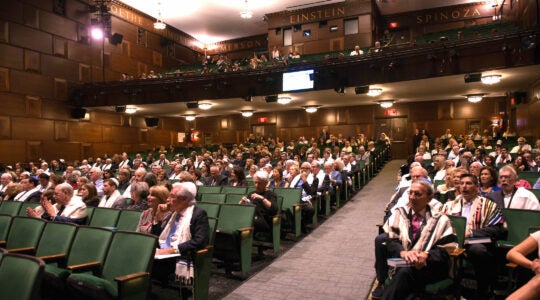Tel Aviv – American Jews should consider a march on Washington unless the "crisis" in the U.S.-Israel relationship is resolved soon, according to Abraham Foxman, national director of the Anti-Defamation League.
He observed that there is a "debate in the American Jewish community" about the best way to achieve Arab-Israeli peace and that such a march in the nation’s capital would demonstrate where the American Jewish community lines up on this issue.
Foxman said he believes that the American Jewish community’s opposition to settlement building is still strong, but that the opposition does not apply to building in Jerusalem.
Fueling that debate, Foxman said, was the full-page newspaper ad from J Street that ran last week when Prime Minister Benjamin Netanyahu visited Washington, during which he met with President Barack Obama. Foxman said the ad’s message was "Right on, Mr. President."
"Maybe it [J Street] is pro-peace but I question how pro-Israel it is," Foxman told more than 200 people at the Dix Hills Jewish Center on Long Island last week. "The prime minister is here and struggling [with the president] and J Street says, ‘Mr. President keep it up.’"
"Obama needs to hear from the American Jewish community not that he’s anti-Semitic or that he’s a Muslim, but that, Mr. President, this is not in the best interests of America," Foxman said.
Hadar Susskind, director of policy and strategy for J Street, said: "We view the Obama administration’s efforts to end the Israeli-Palestinian conflict through a two-state solution as both in Israel’s best interest and in the American national interest. Opposing unilateral, provocative actions by either side that undermine the chances of a two-state solution are laying the seeds for the end of a Jewish, democratic Israel. We support President Obama’s strong stand in recent weeks because we believe he is trying to help Israel avoid that fate."
Foxman added in his talk that a senior Obama administration official told him last year that the White House was preparing to play hardball with Israel because "eight years of making nice to Israel didn’t work," a reference to perceived Israel policy under the Bush administration.
Meanwhile, Israeli officials have reportedly rejected White House demands made during Netanyahu’s meeting with Obama. Among other things, Obama is said to have wanted Israel to commit to a building freeze in east Jerusalem and to include final status issues in indirect talks mediated by the U.S. But Benny Begin, a member of Netanyahu’s inner cabinet, told Israel Radio Monday that the status of east Jerusalem should be resolved through direct talks with the Palestinians.
The Israeli newspaper Haaretz, citing sources in Jerusalem, said Monday that the Obama administration is prepared to impose a permanent solution on Israel and the Palestinians within the next two years.
In response to the White House, Israeli Defense Minister Ehud Barak said Israel should formulate its own peace initiative to demonstrate its seriousness in resolving the Arab-Israeli conflict during a "delicate and tense diplomatic situation."
"The U.S. administration is looking for an answer to the question of whether Israel is energetically and seriously going along with it toward broad understandings in the diplomatic process," Barak told reporters on Sunday.
"In other words, direct talks on core questions," he continued. "This is the question bothering the U.S. administration more than the concrete requests … that are still being discussed in the contacts between us."
"The real challenge … is how to we advance toward an Israeli diplomatic initiative for negotiations and an agreement," Barak added. "This will be our challenge in the coming weeks."
Among the points of contention between Israel and the U.S. is the future of building in the areas of Jerusalem annexed to the Israeli capital after 1967, as well as the agenda for the indirect peace negotiations that the Obama administration is trying to get started.
Since his return from Washington, Netanyahu has met several times with a group of seven cabinet ministers who advise him on security and diplomacy, but there was no immediate word on the results of the discussion.
Until now, the prime minister has said he’s willing to offer gestures in the West Bank to boost the peace process. Jerusalem, he insisted, will continue to be expanded for Jewish housing.
Despite the ongoing efforts to defuse the spat, observers on both sides of the Israeli political spectrum believe that the standoff will only worsen as long as Netanyahu’s Likud Party, Foreign Minister Avigdor Lieberman’s ultra-nationalist Yisrael Beiteinu Party and the ultra-Orthodox Shas Party are the principals.
But some Jewish leaders here said they believe there is not yet a crisis in the relationship. Rabbi Eric Yoffie, president of the Union for Reform Judaism, said he believed it is in Israel’s interest to "resolve the differences with the administration."
"Even in the midst of this difficult period it should be possible to work out a deal with the administration, and that needs to be the goal of the American Jewish community and the government of Israel," he said. "I don’t think we should be talking now about confrontational events. Confrontational language on anybody’s part – the government of Israel, the U.S. and leaders of the American Jewish community – is a mistake. That kind of thing spins out of control. Let us resolve these issues."
Jason Isaacson, director of government and international affairs for the American Jewish Committee, said that although there is a dispute, Israel and the U.S. are "closely engaged and I expect they will not allow it to explode into a crisis."
"There is a lot of heated rhetoric and spin on all sides," he continued. "I don’t believe the treatment accorded to the prime minister was befitting the treatment one would expect of a friend and ally. But to say there is a crisis overstates the case. What we need to focus on is the true threat – Iran. We don’t want the enemies of Israel or peace to interpret this dispute between allies as a crisis that may signal a lack of solidarity."
But Gerald Steinberg, a political science professor at Bar-Ilan University, said the entire picture has yet to emerge and that he would discount newspaper stories that purport to report on what happened when Netanyahu and Obama met.
"Nobody outside a very close circle know any of the details," he said. "And we have not seen how the U.S. is going to deal with the Palestinians and the Arabs. What are they going to squeeze out regarding refugee claims and the recognition of Israel as a Jewish state? Clearly there is going to be a package here, and clearly there is a lot of pressure and a crisis. But the administration has learned that it is not going to impose something on Israel that the Israeli public sees as suicidal.
"I expect even stronger pressure on the Arab and Palestinian side once [the administration] has gotten something from Israel. The problem for Israel is that Obama began with pressure on Israel because he believes it is the stronger party, and that is hard for Netanyahu and Israel to accept."
Regarding the fruitfulness of a march on Washington, Steinberg said: "If this becomes a real clash like [Israeli Prime Minister Menachem] Begin and [President Jimmy] Carter or [Prime Minister Yitzchak] Shamir and [President George H.W.] Bush, the American Jewish leadership will also use the forces it has. … If there is a march on Washington, it will galvanize American Jewish support for Israel and expose J Street as an empty vessel."
There are already signs that the members of Israel’s Labor Party are getting restless. Labor Minister Yitzhag Herzog said the party’s parliamentary caucus would convene next month to rethink its participation in the government if there is no progress on negotiations.
"I will recommend joining a Kadima government," he said, referring to the party of Tzipi Livni, the former foreign minister. "Israel is confronting an international situation and threats from Iran, and this requires a change in the structure of the governing coalition."
But that is unlikely to happen as long as Defense Minister Ehud Barak remains at the helm of the party. Barak is unlikely to threaten a withdrawal from the government because he would go from the No. 2 cabinet minister to the leader of a political party in its death throes, said Labor Party cabinet member Eitan Cabel.
"As long as it is dependent on Barak, the Labor Party will not leave the coalition," he said. "He knows that the Labor Party is headed toward darkness."
Cabel, who opposed Labor joining the government, predicted Israel is headed "toward a crisis."
"The Americans are insistent that the government of Israel" spell out its game plan, Cabel said.
The same sense of foreboding exists on the other side of Israel’s political map.
After Netanyahu returned from a reportedly rocky meeting at the White House standing firm against U.S. demands to rein in housing projects in Jerusalem, Likud Party faithful who were previously concerned that he might bend are now lining up behind the prime minister, said a party insider.
"The pressure of Obama strengthens [Netanyahu’s] standing within the Likud because he hasn’t conceded; there is solidarity with him," said Arik Ziv, a party member who edits Likudnik, a Web-based political journal.
In recent months, Netanyahu’s standing within his party suffered a blow because he was perceived as bending on support for a Palestinian state and a settlement building freeze without getting anything in return.
The most far-reaching concession Netanyahu could make on Jerusalem would be to agree to a temporary freeze on an isolated building project, Ziv said. Party members would grumble, but Netanyahu could convince the Likud to back it.
However, a more comprehensive slowdown in Jerusalem would stir up a rear-guard movement within the party reminiscent of the 2005 rebellion against former Prime Minister Ariel Sharon over the Gaza pullout. That said, Ziv said he does not expect Shas or Lieberman to withdraw from the coalition over generous peace concessions.
"Obama should know that Jerusalem will not be the price to justify his Nobel Prize," said Danny Danon, a Likud lawmaker.
Government secretary Tzvi Hauser told Israeli networks that Netanyahu is looking for a "golden path" that will satisfy Obama while remaining faithful to the principles of the Israeli government. Most observers say they don’t know if that grand compromise exists. n
Joshua Mitnick is an Israel correspondent; Stewart Ain is a staff writer.
The New York Jewish Week brings you the stories behind the headlines, keeping you connected to Jewish life in New York. Help sustain the reporting you trust by donating today.




